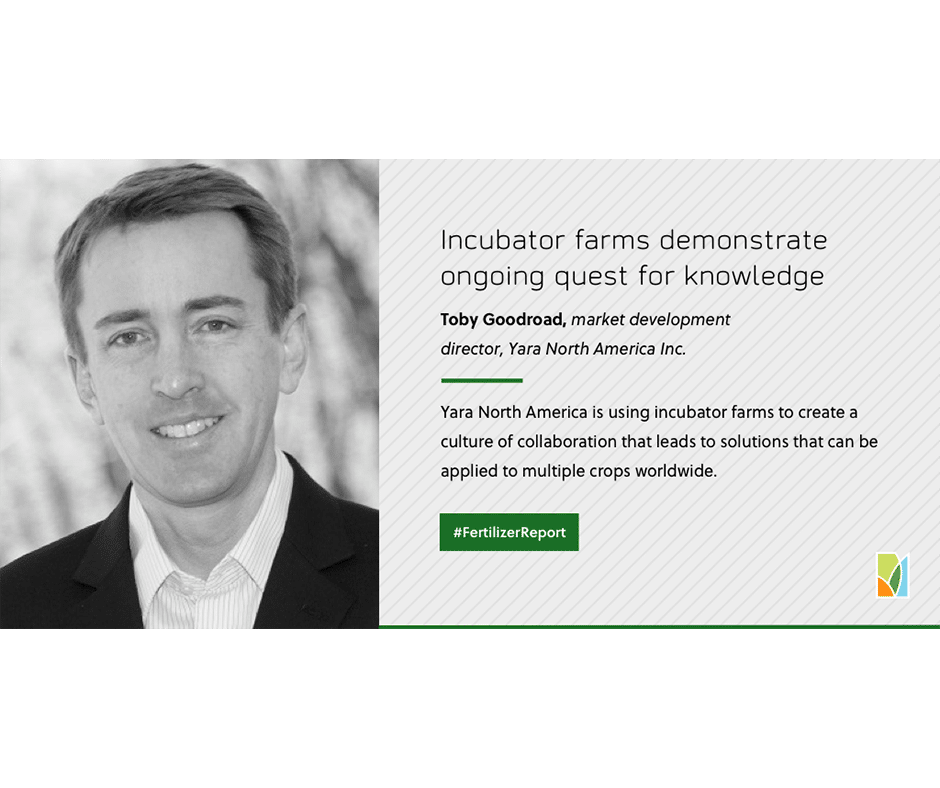This post is part of a series highlighting work across the fertilizer industry as featured in TFI’s State of the Fertilizer Industry Report. Visit http://www.fertilizerreport.org to learn more.
Yara is a global crop nutrition company that has been selling products and solutions since 1905 and employs more than 17,000 workers worldwide. The company places a heavy focus on increasing knowledge in crop nutrition and environmental solutions. One way it does that is by investing to find real-world solutions to crop nutrition needs.
To support this mission, the company established the Yara Incubator Farms in Auburn, Alabama; Modesto, California; and Saskatoon, Saskatchewan, as a place to explore, evolve, refine and share knowledge. Field-scale soil fertility and crop nutrient management research will be done at the combined 240-acre farms in collaboration with partners, customers, and various technology providers.
The incubator farms enable Yara and its partners to gather data and intimate knowledge of every aspect of the cropping system over the years. The Auburn farm, established in partnership with Auburn University, is currently growing corn, cotton, and soybeans on 80 acres, 60 of which are irrigated. The Modesto farm has 40 acres of fertigated and established almonds, and 40 acres of irrigated and established walnuts. The 80-acre Saskatoon farm will be established in 2020 near the Ag In Motion site and focus on the common rotational dryland crops wheat, canola, and pulses.
Toby Goodroad, market development director for Yara North America, says that Yara’s investment in incubator farms and supporting research demonstrates the commitment Yara has to growers and dealer customers.
“These farms are used to generate new knowledge, to try to understand the cropping system as a whole and provide our commercial teams agronomic arguments to try to change things or benefit the industry,” Goodroad said. “We have a little over 800 agronomists on the ground globally working with farmers, working with dealers, trying to provide solutions.”
Goodroad added that their agronomists are always hungry for information and to be trained on the latest science as they are the technical expert of Yara’s fertilizer products. Their collective knowledge helps Yara create trust in the marketplace and bring proper solutions for farmers around the globe.
“I think knowledge is key. We want to sell the right products because at the end of the day, farmers and dealers expect results,” said Goodroad.
The research done on these fields aim to improve nutrient and water use efficiency. Using 4R Nutrient Stewardship principles combined with cultural practices and proper water management, Yara intends to find areas where improvements can be made.
“How can we continuously feed fertility through the season, versus big shots only a few times a year?” Goodroad asked, referring to their research. “How do we keep nutrients and water in the root zone where the crop can access it?” Regarding fertigation he said, “That all comes back to water again, but it also comes back to your ability to manage the fertility going into the irrigation system.”
Goodroad says “Yara wants to help improve the sustainability of the farmer. And the incubator farms can provide some clear answers on how to advise farmers to do things in the most sustainable way.”
“We’re a small voice at the end of the day, but we need to work together and build trust. It’s not all about sales, but it’s all about being here for the next several centuries.”

